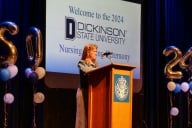You have /5 articles left.
Sign up for a free account or log in.
Faculty members merit a meaningful role in searches for senior administrators, according to the principles of shared governance. Because the decisions chancellors and presidents and their deputies make often impact curriculum, tenure and academic freedom -- all traditionally considered the primary domains of the faculty -- professors tend to want to vet candidates themselves.
So when the Board of Regents of the University of Nebraska proposed changes that would have diminished faculty and student input in searches for senior administrators, professors across the system were united in their opposition. They appealed to the board to reconsider its position through emails, phone calls and media outreach, and at its meeting last week.
And the campaign worked -- in part. The board last week said the changes only would apply to presidential searches at the system level, and that faculty and student input in campus-specific searches for chancellors, vice chancellors and deans would be unaffected.
Many professors were content with the amended changes, which the board subsequently approved. But others say the new bylaws governing faculty input in presidential searches leave something to be desired, since presidents -- especially in relatively small systems such as Nebraska’s -- still play a key role in creating a good environment for teaching and research.
Professors also said that the timing of the board’s vote, at the end of the year and only weeks after the state’s departing governor expressed interest in becoming the system president, raised eyebrows, if not suspicions.
“You could make an argument that, at the system level, administrators don’t have a lot of contact with the faculty, and it’s less important that the faculty is involved [in the search],” said John R. Bender, professor of journalism at the University of Nebraska at Lincoln, the state’s flagship, and president-elect of its Faculty Senate.
But not all faculty members are convinced by that logic, he said. “Ultimately [presidents] are going to have an impact. The decision and policies that presidents make are going to affect the individual campuses, and they’re probably going to affect faculty and students.”
The “big issues” for faculty in particular are tenure and academic freedom, Bender said, to which boards nationwide are increasingly “unsympathetic.”
Under the university’s old bylaws, the board appointed an advisory search committee consisting of representatives of the “principal constituencies” with which the president interacts, namely faculty and students. The bylaws also prescribed general faculty involvement in recommending peer representatives for the committees, along with concrete ways for advisory committees, once formed, to submit candidate lists and otherwise offer feedback. Some of those mechanisms are limited or eliminated under the new bylaws.
Since the board added language to the bylaws last week saying that the changes only applied to presidential searches, much of the faculty opposition has abated.
In an email to fellow faculty members, which he forwarded to Inside Higher Ed, Kenneth Nickerson, professor of biological sciences at the Lincoln campus and current president of its Faculty Senate, said the added language made for a “very nice amendment,” and that the regents had been responsive to faculty concerns.
A. Ross Taylor, associate professor of marketing at the University of Nebraska at Kearney, the state’s teaching college, said the board’s new bylaws admittedly needed some cleaning up to clearly reflect the board’s intentions. But he said he understood that the bylaws regarding presidential searches needed updating to reflect the pace and privacy concerns of contemporary presidential searches.
The bylaws governing senior administrator searches were last updated in the mid-1990s.
But some faculty members said the board’s timing -- just weeks after Governor Dave Heineman publicly announced he wanted the system’s top job -- seemed strange. Those professors who mentioned the connection said they didn’t give it too much credence, since Howard Hawks, board chairman, denounced Heineman’s very public declaration soon after.
In a statement, Hawks said: “Now that the governor has publicly announced his candidacy for the position, his current requests for one-on-one meetings with the members of the Board of Regents, chancellors and other administrators, and search committee members are inappropriate and will not be honored. To do so would present a problem of fairness and it is not practical to track and offer comparable opportunities to all candidates.”
Hawks said via email that initially, “there was a significant misunderstanding about the objectives” of the board in relation to the bylaws.
"But the bottom line is that faculty members were concerned about their role being eliminated or extremely minimized as it relates to senior administrator positions going as low as deans (at least in emails I received),” he said. “Since our meeting, we have received some complimentary emails from faculty senate leaders thanking us for the change. So, I believe that for those who are knowledgeable, this is no longer a concern.”
Melissa Lee, system spokeswoman, said the presidential search team for someone to replace James B. Milliken, who left to become chancellor of the City University of New York, includes several faculty members and students. There are two appointed committees, one for outreach and advising, and one for screening and selection. She denied that the new bylaws have anything to with the governor's announcement.
But the recent changes also have drawn some criticism from outside Nebraska, with experts in shared governance and presidential searches saying it’s important for faculty to play a prominent role even in systemwide searches.
Anita Levy, associate secretary for the American Association of University Professors, said that most “reputable” colleges and universities provide for faculty involvement in presidential searches, and that there’s no reason to think that the principles wouldn’t apply at a system level.
“Joint effort of a most critical kind must be taken when an institution chooses a new president,” reads the AAUP’s Statement on the Government of Colleges and Universities. “The selection of a chief administrative officer should follow upon a cooperative search by the governing board and the faculty, taking into consideration the opinions of others who are appropriately interested. The president should be equally qualified to serve both as the executive officer of the governing board and as the chief academic officer of the institution and the faculty.”
The statement continues: “The president’s dual role requires an ability to interpret to board and faculty the educational views and concepts of institutional government of the other. The president should have the confidence of the board and the faculty.”
Robert O’Neil, former president of the University of Virginia and a senior fellow at the Association Governing Boards, said it was “crucial and compelling” to involve the faculty in presidential searches.
“At whatever level,” he said, “substantial faculty involvement in senior administrative searches strikes me as crucial. Especially against a history of prior involvement, the [Nebraska] modification strikes me as regrettable.”









